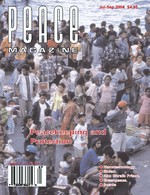
Peace Magazine Jul-Sep 2004, page 31. Some rights reserved.
Search for other articles by PMag staff here
Mordechai Vanunu, having served 18 years in prison for revealing details of Israel's nuclear arsenal, was released on April 17. However, he is forbidden to have contact with foreigners in person or by correspondence, or to leave Israel or move his home without reporting to police. He may not go near foreign embassies, borders, ports, or airports and may not discuss his work at the Dimona nuclear plant or the circumstances of his 1986 kidnapping.
The Association for Civil Rights in Israel are representing him in his appeal to the courts to lift these restrictions. A judge is reading the petition and will decide when to hold the first hearing. However, this decision may not be announced until after the judges' summer vacation, which lasts until September.
Source: msnbc, The Guardian
In June, after nine years of silence and cover-ups, the Republika Srpska (RS) admitted that Bosnian Serb forces had executed thousands of Bosnian Muslims after the fall of the UN-protected enclave, Srebrenica, in July 1995.
A special commission had been set up last year and tasked to provide evidence about the fate of the disappeared. However, its report in April was another cover-up, and the High Representative to Bosnia, Lord Ashdown, fired several RS officials and threatened more firings unless attitudes changed.
The new report took fewer than two months to produce. It showed that Bosnian forces murdered prisoners after the enclave was overrun and later tried to hide the crime by reburying the bodies. The massacre was part of an operation called "Krivaja 95." Should the involvement of Belgrade-controlled units in the massacre be proved, repercussions will follow in Bosnia and the Hague Tribunal. In Bosnia, many people implicated in the tragedy are still at large -- notably Radovan Karadzic and Ratko Mladic -- or even hold senior posts in the RS police and army.
Source: Institute for War & Peace Reporting.
The final preparatory committee meeting for the 2005 Review Conference of the Non-Proliferation Treaty (NPT) ended in disarray on May 7. The delegates could not agree even on an agenda for the Review Conference. The Nuclear Weapons States (NWS) deny that any problem exists with their compliance with Article VI, which calls for good faith negotiations toward the complete elimination of nuclear weapons. The non-NWSs say, in contrast, that the proliferation of nuclear weapons cannot be stopped while the NWSs arrogate to themselves the possession of nuclear weapons and refuse comprehensive negotiations toward elimination, as directed by the International Court of Justice. The gulf between the two positions is so wide that it probably cannot be reduced by Ambassador Sergio Duarte of Brazil, who will preside over the conference.
This crisis is the worst in the 34-year history of the NPT, a treaty that was obtained through a bargain. The NWS agreed to negotiate the elimination of their nuclear weapons in return for the non-NWSs shunning the acquisition of nuclear weapons.
In 1995, the Treaty was extended indefinitely only when the NWSs pledged a program of 13 Practical Steps. Now the United States is rejecting its Article VI commitments and stating that the problem of the NPT lies in the lack of compliance by states such as North Korea and Iran. Britain, France, and Russia are abetting the US in the tactic of shifting attention away from Article VI commitments and toward break-out states.
Now a new coalition of States determined to save the NPT must be forged. The beginning of such a partnership exists in the New Agenda Coalition, which was largely responsible for the success of the 2000 Review Conference.
Source: Sen. Douglas Roche
At the G8 Sea Island summit, a plan was announced to fulfill pledges made two years ago at Kananaskis. This will extend financial and technical support to African countries involved in peacekeeping operstions. Over a period of five years, 75,000 troops will be trained and equipped to serve as a gendarmerie, when called upon elsewhere in their continent. African Union countries lack the capacity to carry out such assistance without support from richer countries, as this proposal will do. Many of the troops will be trained in an existing facility in Italy, where simiar heavy police units, carabinieri, are now prepared. Such police fill the gap between military forces and civilian police.
Peacekeeping operations will continue to be authorized by the UN. No change is intended in the actual system of command. Future assignments may extend beyond Africa to other hotspots.

Peace Magazine Jul-Sep 2004, page 31. Some rights reserved.
Search for other articles by PMag staff here